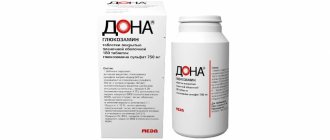What are Aertal tablets for?
The active ingredient of Aertal is aceclofenac. This is an anti-inflammatory drug with an analgesic effect. The tablets are taken for severe pain in the joints and tissues; the drug is especially often used for toothache, when it is not possible to quickly get to the dentist. In addition, sudden pain in the lumbar region can also be easily eliminated by taking the Aertal tablet.
Food intake does not affect the absorption and activity of the components. For severe and persistent pain, take the drug twice a day, one tablet. Exceeding the daily dose is not recommended to avoid negative reactions.
Note!
Description of the drug Airtal por. d/oral. susp. 100 mg package No. 20 on this page is a simplified author’s version of the apteka911 website, created on the basis of the instructions for use.
Before purchasing or using the drug, you should consult your doctor and read the manufacturer's original instructions (attached to each package of the drug). Information about the drug is provided for informational purposes only and should not be used as a guide to self-medication. Only a doctor can decide to prescribe the drug, as well as determine the dose and methods of its use.
What is Aertal powder from?
Powder is a type of dosage form. It is intended for preparing a suspension. A single dose of the drug is packaged in a sachet. The advantage of using the powder is its rapid absorption. The tablet requires time to be broken down and processed in the gastrointestinal tract, and the powder, once in the stomach, begins to be absorbed into the blood without waiting for delivery to the intestines. The active substance contained in the tablets is contained in the same volume in one sachet.
Another advantage of using powder is the ability to accurately adjust the dose. For example, people with kidney or liver failure need to reduce the single dose by half. By dividing the contents of the package into two parts, it is easy to prepare a suspension of the desired concentration.
Contraindications
- hypersensitivity to aceclofenac, other non-steroidal anti-inflammatory drugs (NSAIDs) or to any auxiliary component of the drug;
- asthma attacks, acute rhinitis, angioedema or urticaria caused by taking acetylsalicylic acid or other NSAIDs;
- history of gastrointestinal bleeding or ulcer perforation associated with previous NSAID therapy;
- ulcer or bleeding, including a history (two or more separate proven episodes of ulcer or bleeding);
- acute bleeding or diseases accompanied by bleeding (hemophilia or bleeding disorders);
- congestive heart failure (NYHA functional class II-IV) coronary heart disease, including angina pectoris or previous myocardial infarction, peripheral arterial disease;
- cerobrovascular disorders or diseases; history of stroke or episodes of transient ischemic attacks;
- coronary artery bypass grafting (to relieve pre-operative pain) or use of a heart-lung machine);
- severe liver failure;
- severe renal failure.
What is Aertal ointment for?
Ointment is a form for topical use. It is applied to damaged joints or areas of the body. Indications for use are bruises, sprains, dislocations, torticollis, or shooting sharp pain in the lower back.
The ointment is applied in a small amount to the sore spot and thoroughly rubbed into the tissue with massaging movements. Once in the body, the drug is absorbed into the blood, from where it is distributed throughout the body. As additional components, the ointment contains liquid paraffin and wax, which make its consistency soft and elastic.
Aertal or Xefokam: which is better?
Ksefokam, like Airtal, is an anesthetic drug. Its activity is primarily observed in rheumatoid arthritis, osteoarthritis and other types of joint and bone pain. However, unlike Airtal, Xefocam is based on another active substance - lornoxicam, which does not in any way affect the level of inflammation and the patient’s body temperature. The drug is suitable for symptomatic use and relief of sudden pain.
Adverse reactions for both drugs are identical. Long-term use can cause anemia, thrombocytopenia, insomnia, and depression. When choosing between medications, you need to pay special attention to individual intolerance to the components, and the need to relieve inflammation and normalize the temperature.
Both drugs are contraindicated during pregnancy and breastfeeding, since their active ingredients are instantly and almost completely absorbed into the blood. These drugs are also not prescribed to patients under 18 years of age. Bronchial asthma is a direct contraindication to the use of both drugs, since both of them can cause bronchospasm.
Is it possible to take Aertal with alcohol?
Removing Airtal from the body puts a serious burden on the liver and kidneys. Alcohol, entering the blood at the same time as Aertal, can aggravate the condition of the filtering organs, because its presence puts additional stress on the liver. Alcoholism is a direct contraindication to the use of Aertal, as this can lead to organ dysfunction.
In addition, many alcoholic drinks are diuretics, which increases the load on the kidneys. If there is stagnation of fluid in the body and the simultaneous use of Aertal, intoxication is possible, since the initially taken dose of the drug will not be removed from the body before the patient takes the second tablet.
AERTAL powder for the preparation of suspension for oral administration 100 mg sachet 3g No. 20
Avoid using Airtal® concomitantly with other NSAIDs, including selective cyclooxygenase-2 inhibitors. Adverse events can be reduced by shortening the duration of treatment as much as possible and reducing the dose of the drug to the minimum necessary to achieve control of the symptoms of the disease. Effect on the gastrointestinal tract. Aceclofenac should be prescribed with caution and under close medical supervision to patients with the diseases listed below, as their course may worsen: - symptoms indicating gastrointestinal diseases, including the upper and lower gastrointestinal tract; - a history of ulcer, bleeding or perforation of a stomach or intestinal ulcer in the presence of Helicobacter pylori infection; - history of ulcerative colitis; - history of Crohn's disease; - hematological diseases, systemic lupus erythematosus (SLE), porphyria and hematopoietic disorders. There have been reports of gastrointestinal bleeding, gastric or intestinal ulceration or perforation of the ulcer, which can lead to death with any NSAID at any time during treatment, with or without alarm symptoms, regardless of a history of serious gastrointestinal complications . The risk of gastrointestinal bleeding, ulceration, or ulcer perforation is greater when treated with high doses of NSAIDs in patients with a history of gastric or intestinal ulcers, especially if complicated by bleeding or perforation, and in elderly patients. Treatment of these patients should begin with the lowest effective dose. Also, when treating these groups of patients and patients who require concomitant use of low-dose acetylsalicylic acid or other drugs that may increase the risk of gastrointestinal complications, the need for combination therapy with protective drugs (for example, misoprostol or proton pump inhibitors) should be considered. . Patients with a history of gastrointestinal disease, especially the elderly, should report any unusual abdominal symptoms (especially gastrointestinal bleeding), paying maximum attention to symptoms early in treatment. Caution should be exercised when treating patients receiving concomitant medications that may increase the risk of ulceration or bleeding, such as systemic corticosteroids, anticoagulants such as warfarin, selective serotonin reuptake inhibitors, or antiplatelet drugs such as acetylsalicylic acid. If gastrointestinal bleeding or ulceration occurs in patients taking Airtal®, treatment should be discontinued. Effect on the cardiovascular system and cerebral circulation. When treating patients with arterial hypertension and/or chronic heart failure, appropriate monitoring and recommendations should be provided, as there are reports of the development of fluid retention and edema during treatment with NSAIDs. There is evidence to suggest that some NSAIDs (especially in high doses and in long-term treatment) may increase the risk of arterial thrombotic complications (eg, myocardial infarction or stroke). There is insufficient data to exclude this risk when using aceclofenac. Patients with uncontrolled arterial hypertension, congestive heart failure, established coronary artery disease, peripheral arterial disease and/or cerebrovascular disease should begin treatment with aceclofenac only after an informed decision by the attending physician. Likewise, the indications for long-term treatment in patients with risk factors for cardiovascular disease (eg, hypertension, hyperlipidemia, diabetes mellitus, and smoking) should be carefully assessed before initiation. Caution and close medical supervision should also be exercised when using aceclofenac in patients with a history of cerebral hemorrhage. Effect on the liver and kidneys. Treatment with NSAIDs may cause a dose-dependent decrease in prostaglandin synthesis and precipitate renal failure. The importance of prostaglandins in maintaining renal blood flow in patients with impaired cardiac or renal function, liver dysfunction, patients receiving diuretic treatment or recovering from abdominal surgery, and elderly patients should be taken into account. Caution should be exercised when treating patients with impaired liver or kidney function, as well as patients with other diseases predisposing to fluid retention. In these patients, treatment with NSAIDs may lead to impaired renal function and fluid retention. Caution must also be exercised when using the drug in patients receiving diuretic treatment or, conversely, in patients at risk of hypovolemia. The minimum effective dose should be prescribed and renal function should be regularly monitored. The effect of the drug on renal function is usually reversible after discontinuation of aceclofenac. Treatment with aceclofenac should be discontinued if deviations from normal liver function tests persist or increase, clinical symptoms consistent with the development of liver failure appear, or other manifestations (eg, eosinophilia, rash) appear. Hepatitis can develop without previous symptoms. In patients with hepatic porphyria, the use of NSAIDs may provoke an exacerbation of the disease. Hypersensitivity and skin reactions. As with the use of other NSAIDs, allergic reactions, including diaphylactic/anaphylactoid reactions, may occur already in the early stages of drug use. In very rare cases, serious skin reactions have been observed with the use of NSAIDs, including exfoliative dermatitis, Stevens-Johnson syndrome and toxic epidermal necrolysis, some of which can lead to death. Patients are at highest risk of developing these reactions early in treatment, with most reactions occurring within the first month of treatment. At the first sign of skin rash, damage to the mucous membranes or any other symptoms of hypersensitivity, treatment with Airtal® should be discontinued. In extremely rare cases, chickenpox can cause serious infectious complications of the skin and soft tissues. At the moment, the role of NSAIDs in worsening the course of these infectious complications cannot be excluded. Therefore, it is recommended to avoid the use of Airtal® for chickenpox. Effect on hematological parameters. Aceclofenac can reversibly inhibit platelet aggregation. Respiratory system disorders. Caution should be exercised when using the drug in patients with bronchial asthma or with a history of bronchial asthma, as there are reports that NSAIDs may cause bronchospasm in such patients. Elderly patients. Caution should be exercised when treating elderly patients, as in this age group the incidence of adverse events associated with NSAID treatment is increased, especially gastrointestinal bleeding and ulcer perforation, which can lead to death. In addition, elderly patients are more susceptible to renal, hepatic or cardiovascular failure. Long-term treatment. It is necessary to carefully monitor all patients receiving long-term treatment with NSAIDs, regularly performing complete blood count, liver and kidney function tests. Each sachet of Airtal®, powder for oral suspension, 100 mg, contains 2.64 g of sorbitol, which can cause gastrointestinal disorders and diarrhea. Patients with rare hereditary fructose intolerance should not be prescribed this drug. Airtal®, powder for oral suspension, 100 mg, contains aspartame, a source of phenylalanine. Patients with phenylketonuria should note that each sachet contains 5.61 mg of phenylalanine. Impact on the ability to drive vehicles and operate machinery. You should refrain from driving vehicles and engaging in other potentially hazardous activities that require increased concentration and speed of psychomotor reactions, as the drug may cause dizziness and other side effects that may affect these abilities.
How to replace the drug Airtal
The group of non-steroidal anti-inflammatory analgesics includes a whole list of drugs, including cheaper ones and those that have fewer contraindications in their description.
Paracetamol and ibuprofen are considered the safest. These substances, being part of many multicomponent drugs, relieve pain, normalize body temperature and reduce the intensity of the inflammatory process. Both paracetamol and ibuprofen are approved for use in children. The dosage form in the form of syrup allows use by children over 3 months. Ibuprofen is better for toothache and joint pain.
Paracetamol is aimed at combating headaches and muscle aches. For severe joint pain, Aertan can be replaced with Diclofenac. This active substance is sold in pharmacies. Under the same name it is found not only in the form of tablets, but also in the form of ointments, patches and ampoules for intramuscular administration. The extended-release formula of the tablets allows you to take one dose, which will relieve severe pain for 24 hours.


